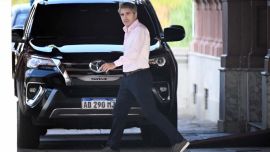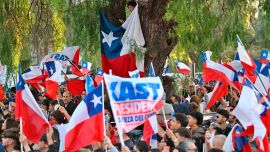President Mauricio Macri has opened up another fault-line between his administration and the opposition, after announcing this week that the nation’s Armed Forces would take on tasks related to domestic and border security “to protect national sovereignty and the integrity of [Argentina’s] territory.”
Via a decree published in the Official Gazette, the government will move to broaden the responsibilities of the Armed Forces, a move which human rights organisations immediately criticised. The activities of the country’s military are a sensitive topic in Argentina given the atrocities and mass killings committed by the military during the 1976-1983 dictatorship.
Speaking Monday, prior to the decree’s publication the following day, the president said he would remove a ban on military involvement in fighting crime, terrorist threats and other internal security issues. He said he would modify an existing 2006 decree that limits the Armed Forces to defensive manouevres against attacks by another country.
“It’s important that they can collaborate in internal security, mainly by providing logistic support in the border zones,” he said at a public act held at a military base on the outskirts of the capital.
The move sparked immediate anger from the opposition and many activists, with lawmakers criticising the Macri for opting for a decree, rather than taking the issue to Congress.
The opposition has demanded Congress address the issue.
“The [current] decree repeals two or three articles of a decree issued by former president Néstor Kirchner that regulated the Defence Law to determine that the Armed Forces could seek to limit external attacks provided they came from another State,” responded Defence Minister Oscar Aguad this week.
He argued that the rule saying the conflict must originate from another state could be abused by Argentina’s enemies, warning of a situation in which the military “had no sense of being.”
“We have repealed that part of Kirchner’s decree and the Armed Forces are now allowed to act against any external attacks that may be perpetrated by a state or by new organisations that endanger Argentine territorial sovereignty,” he said.
PROTESTS, CRITICISM
Human rights activists said President Macri’s decision could authorise military espionage, lead to repression and increase violence.
“Involving the Armed Forces in security issues puts at risk the civil government and human rights ... we have to reject this reform and defend the strict separation between defence and security,” said the Center for Legal and Social Studies (CELS).
On Thursday, human rights organisations and thousands of protesters marched from the Plaza de Mayo to the Defence Ministry in Buenos Aires, rejecting the decree and calling for it to be withdrawn.
Many demonstrators accused the government of secretly intending to militarise the nation’s streets in the face of increasing social unrest.
“We are very hurt … never again in our country we will have the Armed Forces against the people,” said Virginia Fons, 67, a retired architect.
Human rights groups estimate up to 30,000 people were kidnapped, tortured or killed during the dark days of the last military dictatorship.
“With this decree lies the risk that the Armed Forces, by the order of the Executive power itself, will exceed the functions that the words attribute to them,” said Gustavo Pérez, a 60-yearold university professor.
“The decree contemplates a set of functions, such as combating drug-trafficking, and in other countries it has already been proven that ... instead of neutralising the power of drugtrafficking [security forces] end up involved with them,” he said.
Former Defence Minister Agustín Rossi argued that the separation of national defence from internal security had been a state policy since 1983 and that should remain unchanged.
“Involving the Armed Forces in drug-trafficking issues is illegal. In countries like Colombia, Brazil and Mexico this failed, and it is now being carefully examined,” said Rossi, who previously served in Cristina Fernández de Kirchner’s administration.
Opposition lawmaker Felipe Solá warned that “the Armed Forces are not prepared to carry out internal security,” calling the decision “tragic.”
Speaking Wednesday, Aguad flatly rejected claims that modifications to the Defence Law would give the Armed Forces the power to intervene in social conflicts. He also clarified that military will not replace the Gendarmerie (Border Guard) along the borders.
“It never occurred to us to think of a hypothesis of that nature [the Armed Forces patrolling cities or intervening in social conflicts]. This is a problem for the security forces,” the minister said. “The military’s presence on the borders will not replace the Gendarmerie. What is planned on the border [are measures] to prevent drug-trafficking and international terrorism from taking root in Argentine territory.”
A guard cited “vulnerable” populations in Argentina’s north who needed protection.
“We’re restoring legality. Former president [Néstor] Kirchner had exceeded this and limited the actions of the Armed Forces,” he told the Noticias Argentinas news agency, adding that he thought the Defence Law issued by the government of former president Raúl Alfonsín 35 years ago should be reviewed by Congress. “We have to revise our Domestic Security Law and the Intelligence Law, which [together with the Defence Law] are the three pillars of security in Argentina,” he said.
RENEWAL
Decree 683/2018, published in the Official Gazette on Monday, establishes the operational participation of the Armed Forces in tasks to support the security forces. It bears the signature of President Macri, his Cabinet Chief Marcos Peña, and Defence Minister Aguad. The decree implies a renewing of the Armed Forces, as well as its role. Several major restrictions on the military’s activities remain in place from previous governments.
Speaking Monday, Macri said Argentina needed “Armed Forces that are capable of facing the challenges of the 21st century” saying the nation had “an outdated defence system” that was “the product of years of underinvestment and the absence of a long-term policy.”
The infrastructure of the Armed Forces and personnel numbers have significantly declined since the military’s departure from power, particularly in the last decade under the Néstor Kirchner and Cristina Fernández de Kirchner governments.
DETAILS OF THE PLANS
According to the government’s plans, seen by the Perfil newspaper, the expansion set out in the new National Defence System would include:
– Airspace surveillance and control, with an emphasis on the northern provinces
– A surveillance and presence near the borders
– Surveillance and control of maritime areas
– Protection of key strategic areas (for example the Yacyreta dam)
– Protection of events of strategic interest in collaboration with the Internal Security System (for example the G20)
– Logistical support to the security forces There would be three types of operations:
– Civil Protection Operations (humanitarian assistance, community support)
– Cyber defence operations (surveillance and control of cyberspace and the anticipation and prevention of cyber attacks; guaranteeing the security of networks and vital state information).
– Support operations for the generation of scientific knowledge: Addressing developments that suppose a competitive advantage within the framework of technological autonomy in sensitive areas of Defence; Generating networks through available capacities (institutes, research centres, universities and industry); Collaboratation in the generation of knowledge that contributes to a policy of sustainable exploitation of maritime resources.






















Comments